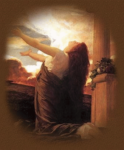 “The Song of songs, which is Solomon’s” – Song 1:1
“The Song of songs, which is Solomon’s” – Song 1:1
The second part of verse 1 mentions Solomon, and depending on the translation, implies that he is the author of the Song of Songs. At least this is what has been commonly accepted throughout history. Clearly, having King Solomon’s name in the beginning section helped to get the book accepted into the the biblical ‘canon,’ despite its more provocative content.
But is there another aspect to authorship here? What about the woman in the Song? What role did she play?
Look at these points:
1. Verse numbering was added by scribes later in history, and was not always seen to be helpful. The first verse is actually a title and superscription, similar to what some of the Psalms start off with.
2. The content of the Song is almost entirely written from the woman’s perspective, sharing her struggles, private dreams, thoughts about Solomon, and conversations with her friends. Often Solomon is not even present in the situations that she describes first hand.
3. Not only this, but her words are in the 1st person tense. (“I, me,” etc.)
4. The Woman has the first words in the Song, (1:2) the last words, (8:14) and the majority of the content as well.
All of this is compelling evidence to reveal the Woman as being, at least, a co-author of this beautiful masterpiece with Solomon. Which leads to the next question. Why was her name not added to the superscription? Or anywhere in the book, for that matter? And why is there so little information about this Woman in history?
Well, none of this is surprising in a society and religion that largely suppressed women and their voice. The pleasure of sex was also man’s domain – and the boldness by which the Woman in the Song speaks of her desires would be another reason why it would not be acceptable to have a woman’s name attached to this kind of work.
But with all that said, I believe the Woman, although courageous as she is, is also wise. Intentionally leaving her name out would help protect this writing until a time and place when a woman would not be rejected for breaking cultural norms for a higher purpose.
That time and place is Christ.
“…there is neither male nor female; for you are all one in Christ Jesus.” – Galatians 3:28
That the Song of Songs is a collaboration between both Solomon and the Shulamite woman is so rich with application for those who have their life in Christ. True “oneness” is a partnership of two – operating as one – their thoughts, words and actions so meshed together that it is hard to tell them apart! Scholars to this day struggle to know who is speaking in the Song of Songs, as there are no markers that tell us if it’s the man or the woman. How perfect that this is the case!
Furthermore, there is the fact that we are Christ’s body. To a physical world, we sing the songs, wield the pens, speak the words of life, and bring a healing touch of relief to those who are sick and in need. And yet without a connection to the Head, we literally can do nothing, except works of death.
So let’s pray toward this end – that we be like this Woman whose focus was on intimacy with God, and who was wise in her situation to deflect attention from her self. In doing so, we too may be “hidden away” for a season, as this female author in the Bible was, but in God’s timing, she (and all in her) cannot not be revealed.
How beautiful on the mountains
are the sandled feet [or the pen, lips, hands, etc.]
of this one [the Bride] bringing such good news!
Song of Songs 7:1 (TPT)
📖 NEXT POST: “Determined to be Kissed“
📖 ALSO SEE: “A Definition of Oneness, by Jeanne Guyon”





3 comments
Hi Pamela. Your insight to the authorship of “The Song of Solomon” is on point. It is one of those things we all can discuss but will never know until we are with the Lord.
According to some Jewish scholars the writing appeared after the captivity, sometime in the 4th or 3rd centuries BC. There are portions of it in the Dead Sea Scrolls, also. Even though there is no mention of God, a history of Israel or a definitive story line, the Hebrew scholars included the “Song” in the canon because it bore Solomon’s name as the author. My belief, like yours, is that the Shulamite had a lot more to do with the writing as co-author.
In those days the King did not do any writing or recording of history. It was done by scribes. I believe that Solomon could’ve dictated to the scribe both his portion and what the woman wrote. Then his name was added as the author for two reasons: 1) He was King, and 2) Because women were 2nd class citizens at that time, adding his name added credibility to the writing. Now someone (a scribe) was going through Solomon’s “journals” and was inspired by Holy Spirit to publish what was written and since Solomon’s name was on it, the Jewish leaders accepted it. The scribe may have even written Solomon’s name in there to give it credibility. This is one possibility. All of what I just said leads up to what I really believe.
What the woman wrote was in her diary specifically for the reasons you mentioned (she wrote in the first person) It was initially given to Solomon after the love affair blossomed. He combined it with his thoughts, which he may or may not have dictated to his scribe until after he received the diary. Then again, under the inspiration of Holy Spirit it was combined and published as one of his songs under his name.
Since it is allegorical as 1) the relationship of God to Israel (what the Jewish scholars believed); 2) the relationship of Christ to the Church (what Christian scholars believe); and 3) the relationship of Jesus to the individual believer (I believe the most important), it was necessary for it to be discovered and added to the canon of Scriptures.
Sorry I rambled on. Do know I believe you are right on. Keep up the great work. Love you.❤️❤️
Author
Hmm … I never thought of the Song, on an earthly level, coming out of a being a “diary” of the woman. Who then gave it to Solomon, and they combined their words. That’s an interesting detail that I’ll be chewing on in the future. :-)
And oh, please “ramble” away – anytime. :-) It is fun to engage on the mysterious nuances and possibilities of this bottomless book, and your doing so is very encouraging!
I pray more join the discussion do we can hear others’ opinions and or revelations. Enjoying this. ❤️